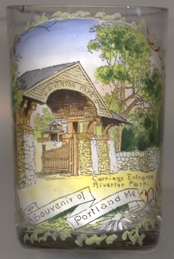

|
| UNITED STATES OF AMERICA | |
| MAINE | |
| Cumberland County |
Portland is situated at an elevation of 19 m on a peninsula in Casco Bay on the Gulf of Maine and the Atlantic Ocean. With a population of about 68,400 (2020) in the city and about 551,700 in the metropolitan region it is the largest city in the U.S. state of Maine and the 104th-largest metropolitan area in the United States.
Native Americans originally called the Portland peninsula Machigonne ('Great Neck'). Portland was named for the English Isle of Portland — and the city of Portland, Oregon, was in turn named for Portland, Maine. The first European settlement was founded at Casco Bay in 1623. Ultimately, the settlement was a failure and the fate of the colonists is unknown. The peninsula was settled in 1632 as a fishing and trading village named Casco. When the Massachusetts Bay Colony took over Casco Bay in 1658, the town's name changed again to Falmouth. In 1786, the citizens of Falmouth formed a separate town in Falmouth Neck and named it Portland, after the isle off the coast of Dorset, England. In 1820, Maine was established as a state with Portland as its capital; however, in 1832, the capital was moved northeast to Augusta. In 1853, upon completion of the Grand Trunk Railway to Montreal, Portland became the primary ice-free winter seaport for Canadian exports. Portland became a 20th-century rail hub as five additional rail lines merged into Portland Terminal Company in 1911. Following nationalization of the Grand Trunk system in 1923, Canadian export traffic was diverted from Portland to Halifax, Nova Scotia, resulting in marked local economic decline. On June 26, 1863, a Confederate raiding party entered the harbor at Portland leading to the Battle of Portland Harbor, one of the northernmost battles of the Civil War. The 1866 Great Fire of Portland, Maine, on July 4, 1866, ignited during the Independence Day celebration, destroyed most of the commercial buildings in the city, half the churches and hundreds of homes. More than 10,000 people were left homeless. By act of the Maine Legislature in 1899, Portland annexed the city of Deering, despite a vote by Deering residents rejecting the annexation, thereby greatly increasing the size of the city and opening areas for development beyond the peninsula.

Glass no. 4139 [left] is labeled Carriage Entrance to Riverton Park.
 Riverton Trolley Park
Riverton Trolley Park
[https://de.wikipedia.org/wiki/Portland_(Maine), https://en.wikipedia.org/wiki/Portland,_Maine;
https://www.portlandmaine.gov/1266/5719/Riverton-Trolley-Park]
![[scale]](lineal.jpg)